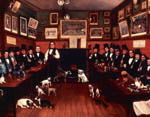Kennel Club celebrates its birthday
The Kennel Club celebrates its 140th birthday this month


In April 1873, 12 Victorian gentlemen met at 2, Albert Mansions, Victoria Street, London SW1, to discuss the necessity for legislation in canine matters. The result was the Kennel Club (KC), which celebrates its 140th birthday this month. Its original brief was to regulate the conduct of dog shows and trials and to register dogs to avoid endless duplication of names-the first volume of the Stud Book contained a confusing proliferation of Spots, Bobs, Bangs, Jets, Nettles and Vics. Now, there are more than six million dog names on the database.
The KC took an early stance on dog welfare and, in 1898, supported by the then Prince of Wales, outlawed dogs with cropped ears from the show ring. An early canine health initiative was the Hip Dysplasia programme in 1965; in the past 20 years alone, information on some 100,000 X-rays has been registered on the KC database. New technology alerts KC staff when someone tries to register five or more litters a year or more than four litters to one bitch. In 2008, the unflattering BBC documentary Pedigree Dogs Exposed prompted a shake-up of KC breed standards, a clampdown on producing dogs with exaggerated characteristics and the reinforcement of the message that only healthy dogs should win prizes. ‘We needed to get a grip,' concedes KC Secretary Caroline Kisko. ‘The big concern was dogs with breathing problems, but, although it won't happen overnight, we're already seeing very different dogs coming into shows and we've introduced vet checks.'
* Subscribe to Country Life and save; Get the Ipad edition
However, Mrs Kisko points out that the real problem is the underground issue of puppy farming. ‘Our mantra is that you should always buy a puppy from a KC-assured breeder because the rest we haven't got a clue about. We're working on this with the different governments, but they've all got different laws, which is daft. Current measures against puppy farming rely on local licensing authorities and that's not working. Our scheme is voluntary, so breeders are saying "I want to be inspected". The other difference is that we know what we're doing.'
Many dog owners welcomed the relaxation of quarantine laws, but the downside, says Mrs Kisko, is the ease with which puppies are being imported from Eastern Europe. ‘Customs aren't checking whether people are genuine owners and so the system is being abused.' The KC is also unhappy with ‘anomalous' changes to legislation on dangerous dogs on private property. ‘We're so busy looking at the end of the lead when we should be looking at the human who's training the dog. A dog will do what it's trained to do. What fills us with horror is that if you're at home-upstairs in the bath, perhaps-the dog is allowed to bite a burglar, but if you're out shopping, it isn't. That's crazy.'
So far in 2013, the KC's successes are the introduction of a law to make the microchipping of dogs compulsory and the news that its Assured Breeder Scheme is now recognized by UKAS (UK Accreditation Service). The organisation is also moving offices in 2015, having sold its Clarges Street site. ‘The KC's view of the world of dogs has very much changed in 140 years,' says Mrs Kisko. ‘It used to be all about pedigree dogs; now, we're here for the sake of all dogs.
The most important things are the rights of owners and dog welfare -our top priority is ensuring that people are properly educated about buying a healthy dog.'
Exquisite houses, the beauty of Nature, and how to get the most from your life, straight to your inbox.
* Follow Country Life magazine on Twitter
Country Life is unlike any other magazine: the only glossy weekly on the newsstand and the only magazine that has been guest-edited by His Majesty The King not once, but twice. It is a celebration of modern rural life and all its diverse joys and pleasures — that was first published in Queen Victoria's Diamond Jubilee year. Our eclectic mixture of witty and informative content — from the most up-to-date property news and commentary and a coveted glimpse inside some of the UK's best houses and gardens, to gardening, the arts and interior design, written by experts in their field — still cannot be found in print or online, anywhere else.
